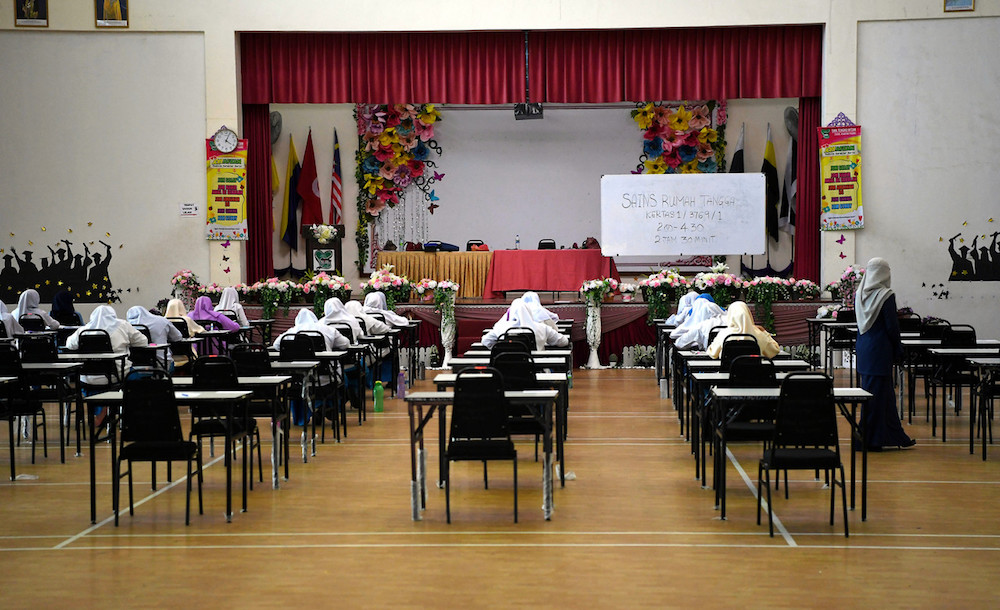KUALA LUMPUR, Jan 31 — Since the movement control order (MCO) was first implemented due to the Covid-19 pandemic in March last year, the education sector is among the most affected and issues on it are being raised until today.
The threat of Covid-19 has led to the Education Ministry (MOE) making several important decisions, including the cancellation of two major examinations, namely the Primary School Achievement Test (UPSR) for Year Six students and the Form Three Assessment Examination (PT3).
The proposal to abolish these two examinations (UPSR and PT3) was raised even before the pandemic hit the country, but could not be done due to various constraints, including objection from parents.
The Covid-19 pandemic also caused the Sijil Pelajaran Malaysia (SPM), Sijil Pelajaran Vokasional (SPVM), Sijil Tinggi Agama Malaysia (STAM) and Sijil Tinggi Pelajaran Malaysia (STPM) 2020 examinations, which were supposed to be held at the end of last year, to be postponed and scheduled to be held early this year.
Nearly 500,000 SPM, SPVM, STAM and 47,008 STPM candidates are expected to sit for the important examination to be held next month and March.
With what is happening now, some think that the education sector is the worst affected by Covid-19. Perhaps this pandemic effect could be the starting point for changes in the assessment of primary and secondary school students, which previously focused on examinations.
The suggestions by several quarters, especially academicians, for the country’s education system to no longer look at the examination system, but instead, to explore the talents and ability of students to be self-reliant should be given serious consideration.
Although debate is still on-going to adapt it in the education system, the path towards it should be opened as wide as possible, according to a lecturer at the Centre of Community Education and Wellbeing, Universiti Kebangsaan Malaysia (UKM) Anuar Ahmad.
He said the evaluation system can be done in other forms, including through continuous evaluation.
“A good and quality assessment may be implemented in other forms. The Examination Board needs to be more open in exploring this matter. A new mentality is very much needed, in line with the changes that are happening today because we have been too long in the traditional examination aspect,” he told Bernama recently.
He said the pandemic has given a lesson that we can no longer depend on examinations alone.
“We must move to a better, newer form of assessment that is more appropriate with time and the future. Through the current examination system, it is possible for a student to get A, B or C, but how far does a student knows on the subject that is taught, his/her ability to master or practise it,” he added.
For example, he said, there are students who can memorise and obtain A in a particular subject, but whether the student is able to give arguments or think outside of what he/she memorised is questionable.
“Therefore, how are we to build an innovative, creative group of students if they still practice the existing examination system. This evaluation system must be raised to a new form if we want to produce a creative and innovative generation,” he said.
Meanwhile, National Association of Parents and Teachers Association (PIBGN) president Associate Professor Datuk Mohamad Ali Hasan opined that it is time for the examination-based assessment system to be overhauled.
The Malaysian education system is currently too “exam oriented”, especially the dependence on examinations and emphasis on academic achievement, he said.
Students’ assessment should be in various aspects towards high-level thinking that encompasses physical, emotional, spiritual, intellectual and socialisation.
Mohamad Ali said these elements of creative, scientific and high level thinking need to be sowed in children as early as possible, if possible at preschool level through more interesting methods, including through games.
If inculcated at an early stage, learning become interesting and fun, it will not be rigid and old-fashioned, he added.
He suggested several measures, including implementing School-based Assessment (PBS) and not 100 percent on year-end examinations.
“PBS can be done by... maybe for the school term system with a score of 33:33:34 (three terms) or for the semester system 50: 50/60: 40 (two semesters).The theory and practical, or assignments given, should be balanced for all subjects, ”he said, adding that this method should also be applied in major examinations such as SPM and STPM. — Bernama



















